| Reviews & Columns |
|
Reviews DVD TV on DVD Blu-ray 4K UHD International DVDs In Theaters Reviews by Studio Video Games Features Collector Series DVDs Easter Egg Database Interviews DVD Talk Radio Feature Articles Columns Anime Talk DVD Savant Horror DVDs The M.O.D. Squad Art House HD Talk Silent DVD
|
DVD Talk Forum |
|
|
| Resources |
|
DVD Price Search Customer Service #'s RCE Info Links |
|
Columns
|
|
|
Umbrellas of Cherbourg: The Criterion Collection, The
The Criterion Collection // Unrated // April 11, 2017
List Price: $39.95 [Buy now and save at Amazon]
The Film:
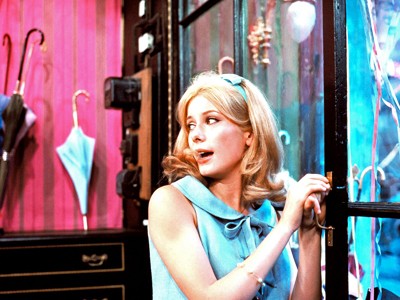 My relationship with musicals is, overall, a little complicated. The exceptionally vibrant attitudes, the bubbly dialogue, and the unnatural introduction of songs into everyday activities might be common criticisms lobbed at the genre, but they're also what hold me back from embracing more of those productions. That just makes the few that I do latch onto feel special, though, from Singin' In the Rain and Disney animated films to Sweeney Todd and Les Miserables -- and, of course, Jacques Demy's The Umbrellas of Cherbourg -- and it often comes down to whether the subject matter has a certain type of bold emotionality and relatability that transcends its genre: tales of poverty, political discord, vengeance, the struggles of the creative process, or tragic love. It was surprising, then, to find myself not joining in on the adoration showered upon Whiplash director Damien Chazelle's La La Land. It's another piece of work centered on struggling, romantically-entangled artists in Hollywood that many had deemed to be "one of those musicals for non-musical people", but one in which the interjection and extended presence of musical elements hits that familiar unnatural note, and where the roadblocks encountered by the jazz musician and burgeoning actress on their way to success revolves around self-satisfied showbiz nostalgia.
My relationship with musicals is, overall, a little complicated. The exceptionally vibrant attitudes, the bubbly dialogue, and the unnatural introduction of songs into everyday activities might be common criticisms lobbed at the genre, but they're also what hold me back from embracing more of those productions. That just makes the few that I do latch onto feel special, though, from Singin' In the Rain and Disney animated films to Sweeney Todd and Les Miserables -- and, of course, Jacques Demy's The Umbrellas of Cherbourg -- and it often comes down to whether the subject matter has a certain type of bold emotionality and relatability that transcends its genre: tales of poverty, political discord, vengeance, the struggles of the creative process, or tragic love. It was surprising, then, to find myself not joining in on the adoration showered upon Whiplash director Damien Chazelle's La La Land. It's another piece of work centered on struggling, romantically-entangled artists in Hollywood that many had deemed to be "one of those musicals for non-musical people", but one in which the interjection and extended presence of musical elements hits that familiar unnatural note, and where the roadblocks encountered by the jazz musician and burgeoning actress on their way to success revolves around self-satisfied showbiz nostalgia.
Chazelle was heavily influenced by Jacques Demy in his creation of La La Land, specifically and quite observably by The Umbrellas of Cherbourg, a different sort of tale about an in-love couple being separated by time and space. The story of Genevieve (Catherine Deneuve), a young clerk at her mother's (Anne Vernor) struggling umbrella shop, and Guy (Nino Castelnuovo), a mechanic who recently became of age to be drafted into the military, follows a different path than that of the recent Oscar contender by focusing on turns of events that aren't universally relatable, hinged on France's mandatory conscription of young men into military service during the late-'50s. Despite how this conflict dates the film and creates a barrier for those who haven't had to deal with the perils of military/wartime romance, there's a tenderness to the relationship and a bittersweet unfolding of the course of events in The Umbrellas of Cherbourg that allows Demy's musical to endure and appeal to broader audiences -- even those outside the musical genre -- due to the genuineness of its sentiments and the risks taken involving poverty, obligation, and disenchantment.
Of course, Demy's film doesn't wallow in those somber underpinnings with its cinematic presence. The Umbrellas of Cherbourg boasts bright, lovely shades of color that lace throughout the titular coastal city almost like streaks found in pieces of fancy ribbon candy, dominating the walls and décor of the umbrella business and spilling out into the bars and other businesses around it. Pastels, pinks, and other insistent palette confections obviously command one's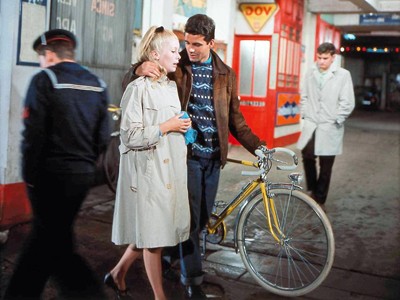 attention, yet it's the sneaky bursts of color tucked away in little spaces that give Genevieve and Guy's gallivanting through the city its charm, from rich expressive greens on textured walls to an abstractly-painted fuchsia and purple wall seen through iron gates. Demy captures a gradient of moods in his visual choices, yet they're not so blatant that they're easily deciphered, where blues only convey sadness and red only convey passion or warning. He holds the audience's interest with aesthetic playfulness, giving them expressive flavors to enjoy without being told what the colors indicate, if they indicate anything beyond how the color makes a viewer feel.
attention, yet it's the sneaky bursts of color tucked away in little spaces that give Genevieve and Guy's gallivanting through the city its charm, from rich expressive greens on textured walls to an abstractly-painted fuchsia and purple wall seen through iron gates. Demy captures a gradient of moods in his visual choices, yet they're not so blatant that they're easily deciphered, where blues only convey sadness and red only convey passion or warning. He holds the audience's interest with aesthetic playfulness, giving them expressive flavors to enjoy without being told what the colors indicate, if they indicate anything beyond how the color makes a viewer feel.
There isn't a moment in The Umbrellas of Cherbourg where dialogue isn't delivered through song or without a kind of choral inflection. For some, this might take a little getting used to since there aren't any breaks between musical numbers for "normal" drama, conveying the gradient of emotions going on around Genevieve and Guy -- devotion, insecurity, frustration -- through a combo of lyrics, vocal tones, and overt body language. Gradually, Demy casts a spell with his combination of lavish colors and constant delivery of music, where the fluently sung dialogue comes across as second nature in his take on ‘50s and ‘60s France, ever presenting a feast for the eyes and ears. More pertinently to this discussion, this locked-in illusion of musical conversation bypasses the entrance and exit of musical numbers in everyday situations since, well, the whole thing's essentially a song, never interrupting moments of romance or family discord between Genevieve and her cynical, pragmatic mother. Questionable transitions from spoken drama to musical drama aren't a concern here.
While the choral performances are dubbed over by other French singers, the dramatic performances are entirely of the actors' making, center of them all being the vacillating, increasingly solemn presence of Catherine Deneuve. For an element that could create a profound disconnect if not delivered right, Demy bridges that gap by pulling tender, entirely genuine performances from both Deneuve and Nino Castelnuovo as Guy, crafting a pair of lovebirds posed with a challenging life decision -- whether to break apart or stay together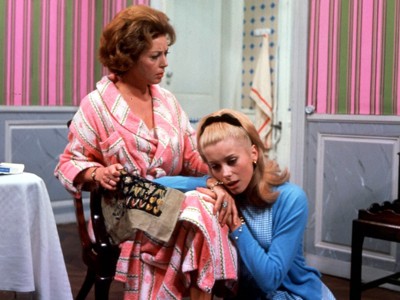 during Guy's enlistment -- that takes on a wide gamut of emotions while they figure out their situation. A charming synergy forms between them through their impeccable facial and body expressions moving in tandem with Demy's intuitive and evenhanded script, hinged on devotion, insecurity, and frustration as they grow closer and cope with the repercussions of their choices. Deneuve commands the breadth of the film's attention, though; the flush of her cheeks and the lamentation in her slumping poise effortlessly deepens one's empathy for her emotional state.
during Guy's enlistment -- that takes on a wide gamut of emotions while they figure out their situation. A charming synergy forms between them through their impeccable facial and body expressions moving in tandem with Demy's intuitive and evenhanded script, hinged on devotion, insecurity, and frustration as they grow closer and cope with the repercussions of their choices. Deneuve commands the breadth of the film's attention, though; the flush of her cheeks and the lamentation in her slumping poise effortlessly deepens one's empathy for her emotional state.
The Umbrellas of Cherbourg transpires across three stretches of time in the young couple life, or lives, spanning several years and showcasing how distance apart from another changed them as individuals. What sets Jacques Demy's depiction of their long-distance woes apart from similar stories, similar decorated and well-regarded musicals, can be observed in the ways that the couple adapts, bends, and breaks to the everyday woes of their life's challenges, how Genevieve handles the prospect of a more comfortable life with a wealthy suitor -- whom her mother favors -- and how Guy copes with returning home from his service. These themes aren't restricted by the moving parts of the film's conceit; instead, they tap into relatable ideas that reflect upon the experiences of anyone who has weighed the pros and cons of momentous decisions in their lives, who has grappled with the controlling suggestions of their parents, and who has endured the rigors of long-distance relationships of many types. With The Umbrellas of Cherbourg, Demy displays spellbinding artistic playfulness and expressive nuance, while striving to be aware enough with its perspective on everyday people that it shouldn't leave anyone out in the cold.
The Blu-ray:
Those who have already purchased The Criterion Collection's delightful and comprehensive boxset The Essential Jacques Demy can attest to the presentation of this standalone release of The Umbrellas of Cherbourg, spine #716 in their collection. Aside from the artwork being expanded to fit within the standalone case, there's nothing differentiating the old disc and the new one, from the exceptional audiovisual presentation to the strong assortment of extras on offer.
Video and Audio:
A lot of love and attention went into restoring Jacques Demy's films several years prior to this release, yielding a beautiful assortment of 2K high-definition transfers that beautifully preserve the director's unique, vibrant aesthetics. The Umbrellas of Cherbourg is among his most vivid pieces of work, perhaps his most vivid, giving the 1.85:1-framed, 1080p AVC transfer plenty to do with truly bold color usage and plenty of glorious close-ups. The Criterion Collection's presentation never misses a beat. Every shade in the palette remains exceedingly potent yet under control enough to not appear oversaturated, and the colors range across the entire rainbow here, though its tilt toward spring shades and pastels are its highest points. Minute details in wall textures, the cross pattern of a veil, the stubble of Guy's beard, and the little details of Genevieve's clothing and jewelry are immaculately presented. Contrast levels are delightfully balanced, presenting rich black shades that enhance the image's depth yet avoid crushing details. Despite this, the transfer isn't perfect: compression artifacts commingle with grain to form a heavier noise than should be there, and a few dust/speckles crop up. Tolerable flaws, largely camouflaged in motion, in what's otherwise a remarkable transfer from Criterion.
Boy, does the music sound great, too. The French 5.1 DTS-HD Master Audio track also has a lot of work to do in handling The Umbrellas of Cherbourg, from the consistent singing to the mix of classic and jazzy tunes in the soundtrack. While not without its squeaky wheels here and there, notably a few fuzzy and pitchy moments of dialogue, Demy's film sounds better than one might expect of something over half a century old. The score naturally dominates one's attention: the mixture of classical elements, distinctively French atmospheric instruments, and percussion rhythm hit on delightful high and low-end elements, exhibiting wonderfully nuanced bass response and a deft focus on the clarity of drumming and other high-pitched elements. Again, verbal clarity isn't perfect, showing its age and a bit of thinness at scattered spots, but the vast majority of the film's singing arrives with robust, aware midrange heft that capably balances with the handful of surround environmental moments throughout. The English subtitle translation is, predictably, terrific.
Special Features:
The extras accompanying The Umbrellas of Cherbourg are numerous and assuredly comprehensive, beginning with an hour-long documentary made in 2008, from the Once Upon a Time (54:23, 16x9 HD) series. Archival interviews with Demy and his actors mix with newly-recorded discussions, plenty of stills/photos and behind-the-scenes shots, and clips from the film to form a strong outlook on what it's made of, discussing how the colors communicate with the story, how the recorded singing dictated the actors' performances, and how Demy conveyed desirability of his characters. Rodney Hill (22:43, 16x9 HD) sits down with a new discussion with the Criterion Collection, where he chats about Demy's relationship with French New Wave cinema and the cautionary tale elements of The Umbrellas of Cherbourg, while an archival series of interviews with Cinepanorama (11:15, 4x3 HD) center on Demy and composer Michel Legrand as they discuss the "expression" of the film's persistent singing and whether classical composers would've made scores for the movies.
The Criterion Collection have also included a pair of audio excerpts, one with Michel Legrand at the National Film Theater (26:46) recorded in 1991 and another with Catherine Deneuve at the National Film Theater (11:03) recorded in 1983. There's also a wonderful Restoration Demonstration (6:11, 16x9 HD) and a Theatrical Trailer (1:56, 16x9 HD).
Final Thoughts:
Underneath the multihued, vaguely avant-garde playfulness of The Umbrellas of Cherbourg lies a somber and emotionally lucid tale of love thwarted by distance, military service, and financial stability. While much of the brilliant cast elevates the dramatic tempo, Deneuve is particularly entrancing as Genevieve, transitioning from doe-eyed optimism to weathered, forlorn consideration of her circumstances without missing a beat. The constant stream of singing for the film's dialogue and its flirtations with melodrama might not make this the kind of musical that'll consistently win over those who simply don't like musicals, but there's novelty and expressiveness at-play in Demy's film that'll appeal to folks who are picky about the kinds of musicals they'll appreciate. The sights, the sounds, and the sensations resonated upon the film's release a half-century ago, and they continue to resonate as an influential classic of the genre to this day. The Criterion Collection's presentation, the same from 2014, looks and sounds spectacular and comes with a downpour of fine extras. Highly Recommended for folks who haven't yet purchased the Essential Demy boxset or who wish to own the film as a standalone.
Thomas Spurlin, Staff Reviewer -- DVDTalk Reviews | Personal Blog/Site
 My relationship with musicals is, overall, a little complicated. The exceptionally vibrant attitudes, the bubbly dialogue, and the unnatural introduction of songs into everyday activities might be common criticisms lobbed at the genre, but they're also what hold me back from embracing more of those productions. That just makes the few that I do latch onto feel special, though, from Singin' In the Rain and Disney animated films to Sweeney Todd and Les Miserables -- and, of course, Jacques Demy's The Umbrellas of Cherbourg -- and it often comes down to whether the subject matter has a certain type of bold emotionality and relatability that transcends its genre: tales of poverty, political discord, vengeance, the struggles of the creative process, or tragic love. It was surprising, then, to find myself not joining in on the adoration showered upon Whiplash director Damien Chazelle's La La Land. It's another piece of work centered on struggling, romantically-entangled artists in Hollywood that many had deemed to be "one of those musicals for non-musical people", but one in which the interjection and extended presence of musical elements hits that familiar unnatural note, and where the roadblocks encountered by the jazz musician and burgeoning actress on their way to success revolves around self-satisfied showbiz nostalgia.
My relationship with musicals is, overall, a little complicated. The exceptionally vibrant attitudes, the bubbly dialogue, and the unnatural introduction of songs into everyday activities might be common criticisms lobbed at the genre, but they're also what hold me back from embracing more of those productions. That just makes the few that I do latch onto feel special, though, from Singin' In the Rain and Disney animated films to Sweeney Todd and Les Miserables -- and, of course, Jacques Demy's The Umbrellas of Cherbourg -- and it often comes down to whether the subject matter has a certain type of bold emotionality and relatability that transcends its genre: tales of poverty, political discord, vengeance, the struggles of the creative process, or tragic love. It was surprising, then, to find myself not joining in on the adoration showered upon Whiplash director Damien Chazelle's La La Land. It's another piece of work centered on struggling, romantically-entangled artists in Hollywood that many had deemed to be "one of those musicals for non-musical people", but one in which the interjection and extended presence of musical elements hits that familiar unnatural note, and where the roadblocks encountered by the jazz musician and burgeoning actress on their way to success revolves around self-satisfied showbiz nostalgia. Chazelle was heavily influenced by Jacques Demy in his creation of La La Land, specifically and quite observably by The Umbrellas of Cherbourg, a different sort of tale about an in-love couple being separated by time and space. The story of Genevieve (Catherine Deneuve), a young clerk at her mother's (Anne Vernor) struggling umbrella shop, and Guy (Nino Castelnuovo), a mechanic who recently became of age to be drafted into the military, follows a different path than that of the recent Oscar contender by focusing on turns of events that aren't universally relatable, hinged on France's mandatory conscription of young men into military service during the late-'50s. Despite how this conflict dates the film and creates a barrier for those who haven't had to deal with the perils of military/wartime romance, there's a tenderness to the relationship and a bittersweet unfolding of the course of events in The Umbrellas of Cherbourg that allows Demy's musical to endure and appeal to broader audiences -- even those outside the musical genre -- due to the genuineness of its sentiments and the risks taken involving poverty, obligation, and disenchantment.
Of course, Demy's film doesn't wallow in those somber underpinnings with its cinematic presence. The Umbrellas of Cherbourg boasts bright, lovely shades of color that lace throughout the titular coastal city almost like streaks found in pieces of fancy ribbon candy, dominating the walls and décor of the umbrella business and spilling out into the bars and other businesses around it. Pastels, pinks, and other insistent palette confections obviously command one's
 attention, yet it's the sneaky bursts of color tucked away in little spaces that give Genevieve and Guy's gallivanting through the city its charm, from rich expressive greens on textured walls to an abstractly-painted fuchsia and purple wall seen through iron gates. Demy captures a gradient of moods in his visual choices, yet they're not so blatant that they're easily deciphered, where blues only convey sadness and red only convey passion or warning. He holds the audience's interest with aesthetic playfulness, giving them expressive flavors to enjoy without being told what the colors indicate, if they indicate anything beyond how the color makes a viewer feel.
attention, yet it's the sneaky bursts of color tucked away in little spaces that give Genevieve and Guy's gallivanting through the city its charm, from rich expressive greens on textured walls to an abstractly-painted fuchsia and purple wall seen through iron gates. Demy captures a gradient of moods in his visual choices, yet they're not so blatant that they're easily deciphered, where blues only convey sadness and red only convey passion or warning. He holds the audience's interest with aesthetic playfulness, giving them expressive flavors to enjoy without being told what the colors indicate, if they indicate anything beyond how the color makes a viewer feel. There isn't a moment in The Umbrellas of Cherbourg where dialogue isn't delivered through song or without a kind of choral inflection. For some, this might take a little getting used to since there aren't any breaks between musical numbers for "normal" drama, conveying the gradient of emotions going on around Genevieve and Guy -- devotion, insecurity, frustration -- through a combo of lyrics, vocal tones, and overt body language. Gradually, Demy casts a spell with his combination of lavish colors and constant delivery of music, where the fluently sung dialogue comes across as second nature in his take on ‘50s and ‘60s France, ever presenting a feast for the eyes and ears. More pertinently to this discussion, this locked-in illusion of musical conversation bypasses the entrance and exit of musical numbers in everyday situations since, well, the whole thing's essentially a song, never interrupting moments of romance or family discord between Genevieve and her cynical, pragmatic mother. Questionable transitions from spoken drama to musical drama aren't a concern here.
While the choral performances are dubbed over by other French singers, the dramatic performances are entirely of the actors' making, center of them all being the vacillating, increasingly solemn presence of Catherine Deneuve. For an element that could create a profound disconnect if not delivered right, Demy bridges that gap by pulling tender, entirely genuine performances from both Deneuve and Nino Castelnuovo as Guy, crafting a pair of lovebirds posed with a challenging life decision -- whether to break apart or stay together
 during Guy's enlistment -- that takes on a wide gamut of emotions while they figure out their situation. A charming synergy forms between them through their impeccable facial and body expressions moving in tandem with Demy's intuitive and evenhanded script, hinged on devotion, insecurity, and frustration as they grow closer and cope with the repercussions of their choices. Deneuve commands the breadth of the film's attention, though; the flush of her cheeks and the lamentation in her slumping poise effortlessly deepens one's empathy for her emotional state.
during Guy's enlistment -- that takes on a wide gamut of emotions while they figure out their situation. A charming synergy forms between them through their impeccable facial and body expressions moving in tandem with Demy's intuitive and evenhanded script, hinged on devotion, insecurity, and frustration as they grow closer and cope with the repercussions of their choices. Deneuve commands the breadth of the film's attention, though; the flush of her cheeks and the lamentation in her slumping poise effortlessly deepens one's empathy for her emotional state. The Umbrellas of Cherbourg transpires across three stretches of time in the young couple life, or lives, spanning several years and showcasing how distance apart from another changed them as individuals. What sets Jacques Demy's depiction of their long-distance woes apart from similar stories, similar decorated and well-regarded musicals, can be observed in the ways that the couple adapts, bends, and breaks to the everyday woes of their life's challenges, how Genevieve handles the prospect of a more comfortable life with a wealthy suitor -- whom her mother favors -- and how Guy copes with returning home from his service. These themes aren't restricted by the moving parts of the film's conceit; instead, they tap into relatable ideas that reflect upon the experiences of anyone who has weighed the pros and cons of momentous decisions in their lives, who has grappled with the controlling suggestions of their parents, and who has endured the rigors of long-distance relationships of many types. With The Umbrellas of Cherbourg, Demy displays spellbinding artistic playfulness and expressive nuance, while striving to be aware enough with its perspective on everyday people that it shouldn't leave anyone out in the cold.
The Blu-ray:
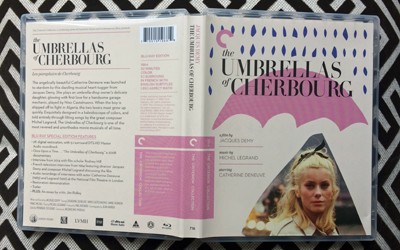 | 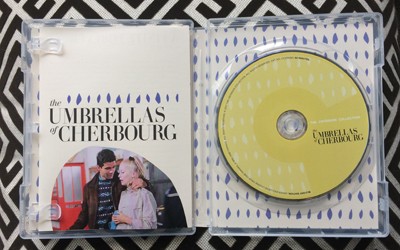 |
Those who have already purchased The Criterion Collection's delightful and comprehensive boxset The Essential Jacques Demy can attest to the presentation of this standalone release of The Umbrellas of Cherbourg, spine #716 in their collection. Aside from the artwork being expanded to fit within the standalone case, there's nothing differentiating the old disc and the new one, from the exceptional audiovisual presentation to the strong assortment of extras on offer.
Video and Audio:
A lot of love and attention went into restoring Jacques Demy's films several years prior to this release, yielding a beautiful assortment of 2K high-definition transfers that beautifully preserve the director's unique, vibrant aesthetics. The Umbrellas of Cherbourg is among his most vivid pieces of work, perhaps his most vivid, giving the 1.85:1-framed, 1080p AVC transfer plenty to do with truly bold color usage and plenty of glorious close-ups. The Criterion Collection's presentation never misses a beat. Every shade in the palette remains exceedingly potent yet under control enough to not appear oversaturated, and the colors range across the entire rainbow here, though its tilt toward spring shades and pastels are its highest points. Minute details in wall textures, the cross pattern of a veil, the stubble of Guy's beard, and the little details of Genevieve's clothing and jewelry are immaculately presented. Contrast levels are delightfully balanced, presenting rich black shades that enhance the image's depth yet avoid crushing details. Despite this, the transfer isn't perfect: compression artifacts commingle with grain to form a heavier noise than should be there, and a few dust/speckles crop up. Tolerable flaws, largely camouflaged in motion, in what's otherwise a remarkable transfer from Criterion.
Boy, does the music sound great, too. The French 5.1 DTS-HD Master Audio track also has a lot of work to do in handling The Umbrellas of Cherbourg, from the consistent singing to the mix of classic and jazzy tunes in the soundtrack. While not without its squeaky wheels here and there, notably a few fuzzy and pitchy moments of dialogue, Demy's film sounds better than one might expect of something over half a century old. The score naturally dominates one's attention: the mixture of classical elements, distinctively French atmospheric instruments, and percussion rhythm hit on delightful high and low-end elements, exhibiting wonderfully nuanced bass response and a deft focus on the clarity of drumming and other high-pitched elements. Again, verbal clarity isn't perfect, showing its age and a bit of thinness at scattered spots, but the vast majority of the film's singing arrives with robust, aware midrange heft that capably balances with the handful of surround environmental moments throughout. The English subtitle translation is, predictably, terrific.
Special Features:
The extras accompanying The Umbrellas of Cherbourg are numerous and assuredly comprehensive, beginning with an hour-long documentary made in 2008, from the Once Upon a Time (54:23, 16x9 HD) series. Archival interviews with Demy and his actors mix with newly-recorded discussions, plenty of stills/photos and behind-the-scenes shots, and clips from the film to form a strong outlook on what it's made of, discussing how the colors communicate with the story, how the recorded singing dictated the actors' performances, and how Demy conveyed desirability of his characters. Rodney Hill (22:43, 16x9 HD) sits down with a new discussion with the Criterion Collection, where he chats about Demy's relationship with French New Wave cinema and the cautionary tale elements of The Umbrellas of Cherbourg, while an archival series of interviews with Cinepanorama (11:15, 4x3 HD) center on Demy and composer Michel Legrand as they discuss the "expression" of the film's persistent singing and whether classical composers would've made scores for the movies.
The Criterion Collection have also included a pair of audio excerpts, one with Michel Legrand at the National Film Theater (26:46) recorded in 1991 and another with Catherine Deneuve at the National Film Theater (11:03) recorded in 1983. There's also a wonderful Restoration Demonstration (6:11, 16x9 HD) and a Theatrical Trailer (1:56, 16x9 HD).
Final Thoughts:
Underneath the multihued, vaguely avant-garde playfulness of The Umbrellas of Cherbourg lies a somber and emotionally lucid tale of love thwarted by distance, military service, and financial stability. While much of the brilliant cast elevates the dramatic tempo, Deneuve is particularly entrancing as Genevieve, transitioning from doe-eyed optimism to weathered, forlorn consideration of her circumstances without missing a beat. The constant stream of singing for the film's dialogue and its flirtations with melodrama might not make this the kind of musical that'll consistently win over those who simply don't like musicals, but there's novelty and expressiveness at-play in Demy's film that'll appeal to folks who are picky about the kinds of musicals they'll appreciate. The sights, the sounds, and the sensations resonated upon the film's release a half-century ago, and they continue to resonate as an influential classic of the genre to this day. The Criterion Collection's presentation, the same from 2014, looks and sounds spectacular and comes with a downpour of fine extras. Highly Recommended for folks who haven't yet purchased the Essential Demy boxset or who wish to own the film as a standalone.
|
| Popular Reviews |
| Sponsored Links |
|
|
| Sponsored Links |
|
|
| Release List | Reviews | Shop | Newsletter | Forum | DVD Giveaways | Blu-Ray | Advertise |
|
Copyright 2024 DVDTalk.com All Rights Reserved. Legal Info, Privacy Policy, Terms of Use,
Manage Preferences,
Your Privacy Choices | |||||||












